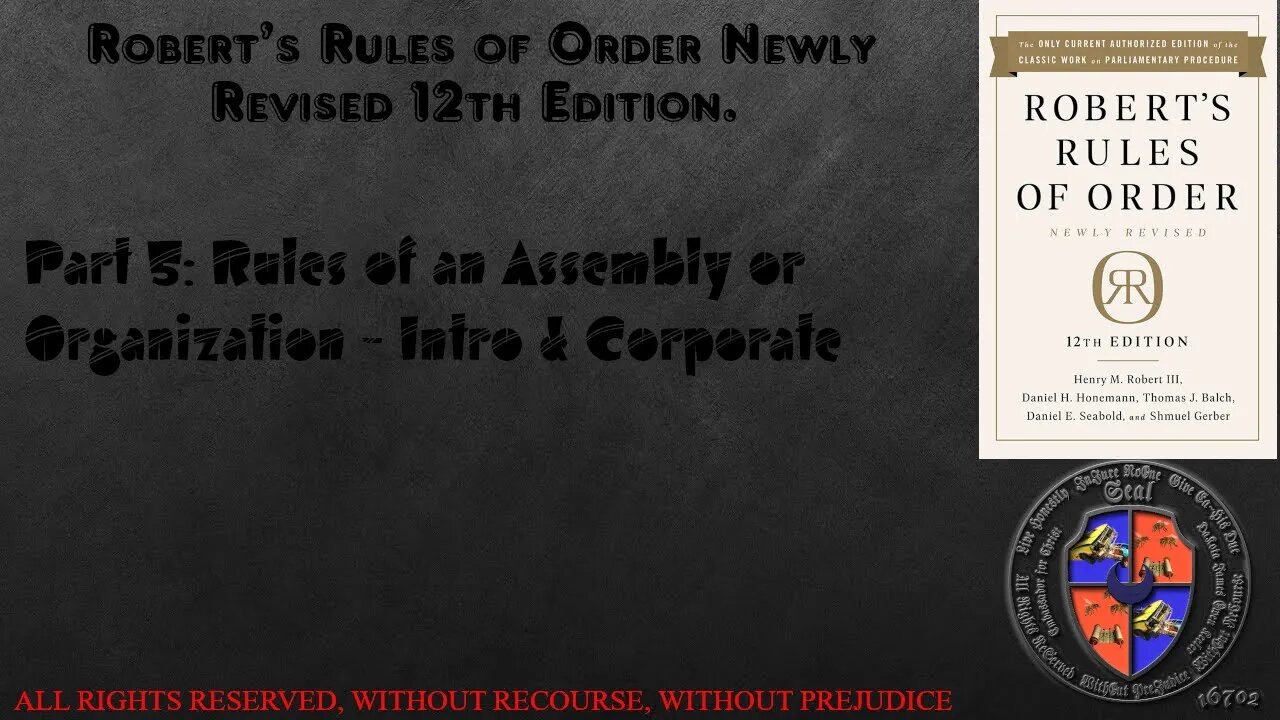Premium Only Content

Rules of an Assembly or Organization - Intro & Corporate Charter
2:1
An organized society requires rules to establish its basic structure and manner of operation. --
Formally adopted rules are necessary to eliminate headache over disputes on what is parliamentary law.
2:2
Experience has shown that some rules of a society should be made harder to change or suspend than
others. Rules may be divided into two classes. 1) Rules needed by every society. 2) Rules required as
conditions warrant them.
An assembly is free to adopt any rules it desires. Even those that violate the established parliamentary
law, so long as its adoption conforms to the general parliamentary law or the bodies customs.
The only limit on rules a society can adopt comes from a high authority. Such as a national or state
body this society belongs to. Or if the sovereign power to which it is subject to has some limitation on
its rules.
2:3
Various kinds of rules a body might adopt.
1. Corporate Charter
2. Constitution and/or bylaws (cf. RONR (12th ed.) 56 & 57.)
3. Rules of Order (Include standard work on parliamentary law as adopted)
4. Standing Rules
2:4
In matters in which there is not adopted rule the body is guided by established custom.
Corporate Charter
2:5
Goes by different name in different states/federal government. (Certificate of Incorporation, Articles of
Incorporation, Articles of Association, Articles of Organization, etc) This document is a legal
instrument that requires the following.
1. Name
2. Object of the Society
3. Any other information needed by the States Statues.Incorporation is sometimes necessary or may be advisable.
1. Hold Property
2. inherit a legacy
3. make legally binding contracts
4. hire employee’s
5. Sue or be sued in societies own name.
6. Protect officers and members from personal liability.
If no law exist requiring a society be incorporated then it is not required.
I am not a lawyer! I do not given legal advice!
2:6
A corporate Charter should be drafted by an attorney. And it must be processed in accordance with
state/federal law. -- Amendments are also subject to any limitations that the incorporating law requires.
2:7
In an incorporated organization its corporate charter supersedes all other rules. -- No rules adopted by
the organization can be in conflict. Nothing in the charter can be suspended by the organization unless
the relevant law/charter allows for it. For this reason it is best to put only what is absolutely necessary
to be incorporated under the relevant law. -- As much as possible should be left to the bylaws.
-
 2:01:45
2:01:45
Quite Frankly
1 day ago"Inauguration Eve: Trump Time Travel Review" 1/17/25
39.4K33 -
 58:42
58:42
SGT Report
4 months agoYour REAL NEWS vs. CIA Mockingbird LIES -- Sam Anthony
167K95 -
 2:59
2:59
LimitlessAmbition
1 day ago $7.22 earnedPROVE THEM WRONG With This POWERFUL Motivation!
73K2 -
 8:31:37
8:31:37
G2G Gaming Channel
14 hours agoGive me my Helmet, Im going in!! #RumbleGaming
88.9K2 -
 4:45:11
4:45:11
MoFio23!
13 hours agoNintendo Switch It UP Saturdays with The Fellas: LIVE - Episode #3
56.4K7 -
 6:23:10
6:23:10
SquallRush
11 hours agoMarvel Rivals Collab
44K -
 8:36:24
8:36:24
stephengaming94
6 days agofar cry 5 live stream part 3
31.2K2 -
 2:03:28
2:03:28
Barry Cunningham
23 hours agoTRUMP DAILY BRIEFING: 2 DAYS TO GO - ARE YOU READY FOR HISTORY TO BE MADE?
62.3K105 -
 13:41
13:41
Tundra Tactical
15 hours ago $10.93 earnedGOA VP Erich Pratt Tells ATF "COMPLY NOW"
83.6K6 -
 21:06
21:06
BlackDiamondGunsandGear
16 hours agoPSA Dagger Micro Self-Destructs During Shooting! What Happened…
55.7K18